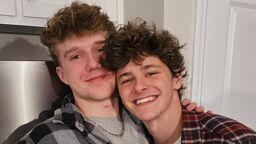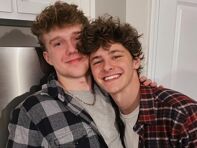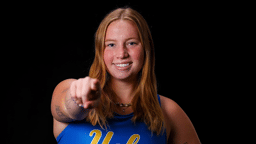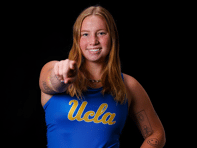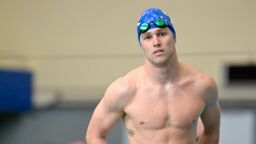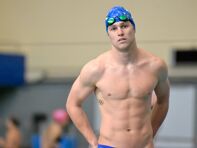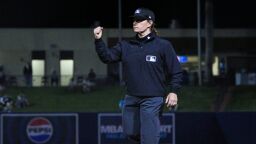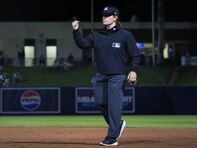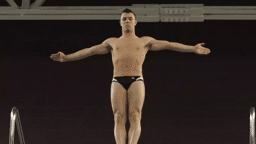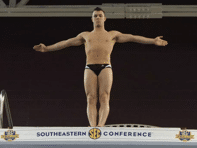As people enter Walker Field House, Vassar College’s main athletic facility, they are greeted by a sizable banner that hangs from the second floor balcony, right above the entrance to the basketball courts.
Displayed on the banner is the recently launched NCAA Division III logo, which consists of an adapted version of the Philadelphia pride flag and the words “one team.” Each letter is bolded, capitalized and a different color.
The banner is purposely placed where those who enter the facility can see it as if to make the statement — Vassar Athletics strives to foster a community of respect and inclusion for LGBTQ+ individuals.
Any LGBTQ+ person who enters the facility — whether it be a varsity student-athlete, a student using the gym, a coach, an administrator, faculty, staff, a spectator or a local community member — is welcome.
The displaying of the banner is part of the Vassar College Queer, Trans and Non-Binary (QTNB) Student-Athlete Working Group’s aim to increase LGBTQ+ inclusion and visibility across campus and within sports. The group was established last fall through partnership with and support from Vassar Athletics and Vassar’s LGBTQ+ Center.
While the working group began with just a handful of students, the Facebook group now has 68 members, which consists primarily of LGBTQ+ varsity student-athletes.
Early in the fall, in partnership with the LGBTQ+ Center and Vassar Athletics, a social event was held for LGBTQ+ student-athletes. The social was a space where individuals could grab a snack, chat with one another and meet the student interns from the LGBTQ+ Center.
Mirit Rutishauser (Class of 2019), a member of Vassar’s fencing team, felt that creating this space and the group was very important:
“I often felt very isolated in a room full of other athletes because of the way I identify, and I’m glad that we have been able to start building a community. I think it is crucial to discuss and combat the inherently binary and exclusive nature of athletics, and I’m looking forward to helping make Vassar Athletics a more inclusive space for all members of the queer, trans, and non binary community.”
The group also aims to increase the positive visibility and share the voices and stories of LGBTQ+ student-athletes at Vassar through social media. So far, our Instagram page, has featured 12 QTNB student-athletes at Vassar, primarily individuals who currently participate on a varsity athletics team at the college.
Through the page, we hope to provide support to any LGBTQ+ athlete that comes across the page. Christian Phelps (’16), a Vassar alumni and former member of the men’s tennis team gave this advice to LGBTQ+ athletes in his post:
“Remind yourself that your ‘queer’ and ‘athlete’ identities are not mutually exclusive This was always hard for me, because while I always loved playing tennis I often felt out of place in sports culture. But loving the link between mind and body that comes with sports isn’t antithetical to queerness — in fact, they are uniquely related!”

Christian demonstrates through his message that QTNB athletes belong in sports and should not have to negotiate their sexual orientation or gender identity in order to find their place in athletics.
This semester, the group has set its eyes beyond Vassar with the hopes to strengthen relations with LGBTQ+ individuals in the local Poughkeepsie, N.Y., community. This spring, in partnership with the Dutchess Pride Center, Vassar looks to welcome local LGBTQ+ youth and young adults to Walker Field House for a field day where they will have the opportunity to meet members of the QTNB working group and Vassar student-athletes, as well as participate in fun activities.

Maeve Sussman (‘19), a member of the Vassar women’s basketball team who is helping to spearhead this event, said that “partnering with the community is very important to me.”
“It gives [us] an opportunity to use our privilege as Vassar students to integrate with locals and collectively make Poughkeepsie a more positive and welcoming place,” Maeve said. “Since I became aware of my own identity, I’ve felt hyper-conscious of how one dimensional athletics spaces [can] present themselves. Over time I realized that many people felt the same way. For me, being a part of the QTNB group means combating this facade and expanding diversity within athletics.”
In addition to developing better ties with the local community, the group aims to further institutionalize policy and practices that are inclusive and welcoming for Vassar’s LGBTQ+ student-athletes. This spring, LGBT SportSafe will visit Vassar to work closely with the Vassar Athletics community to build team cultures that help LGBTQ+ student-athletes thrive in the classroom and in sports.

“We are thrilled to have LGBT SportSafe come in and work with our campus,” said Kaitlin Leach, Associate Director of Athletics for Compliance and Student-Athlete Welfare. “They will be able to provide us with educational programming and take an in-depth look at how we are supporting the members of our LGBTQ+ community on campus.”
Vassar student-athletes will also be wearing rainbow laces from Stonewall Rainbow Laces during practices and competition to stand in solidarity with LGBTQ+ individuals. Vassar’s Student-Athlete Advisory Committee will help implement this project.
Nick Gorman (’21), a member of Vassar men’s rowing who came up with the idea to bring the rainbow shoelaces to Vassar, said that “the Rainbow Shoelaces campaign’s purpose is definitely rooted in visibility for queer, trans, and non-binary athletes, but I think it chiefly demonstrates the strength of ally-ship in athletics at Vassar.
“Any QTNB student-athletes who are currently uncomfortable with the idea of their teammates knowing their identity could be put at ease by seeing the strength of the response to the campaign and seeing their teammates actually sporting the shoelaces in practices, games, or even in public every day.
“The campaign even reaches past athletics, to show students who don’t currently identify themselves as ‘athletes,’ or students who would be apprehensive of their identity and athletic participation clashing on campus. It’s a step toward ending a harmful stigma which divides athletes and non-athletes on campus, bringing us closer to bridging the gap, and practicing true inclusion.”
Through our ongoing efforts at Vassar, we hope to inspire LGBTQ+ student-athletes at other collegiate institutions to develop similar groups.

When Abe Gregory (’21), a member of Vassar’s fencing team, was asked about how the QTNB group had influenced him, he said that “initially I felt uncomfortable about coming out because I felt disenfranchised and without a support group at home, but seeing a queer athletic group on my own campus allowed me to embrace my identity without having to be isolated any longer.”
Additionally, said one member of Vassar men’s baseball team who is just beginning his coming out process, “the QTNB group is an invaluable asset to our sports community at Vassar. It’s been really tough being on a team of 30-plus guys with no known current or former out athletes. I felt so alone, isolated, and unhappy before I found the QTNB group. Now I finally have a social network of people who are like me — I’m so much happier socially, and my play on the field has even improved.”
To me, this group means no more silence …. It means not going to bed at night crying as you feel isolated, lost, and hopeless.
To me, this group means no more silence.
It means putting an end to the questioning athlete on their team who feels out of place and is continuously traumatized by harmful homophobic and transphobic language. It means not going to bed at night crying as you feel isolated, lost, and hopeless.
It’s putting an end to LGBTQ+ athletes burning out and quitting the sport that they love as they desperately struggle to be comfortable in their own skin when surrounded by hateful messaging. Sports are meant to be for everyone.

We are here to claim our rightful place in athletics as QTNB athletes.
At the Walker Field House entrance, a banner for LGBTQ+ inclusion in sports hangs high; it is a message of hope moving forward and a reminder that we all have a shared responsibility to ensure that LGBTQ+ athletes know that they belong, right when they walk through the door.
Nicholas Lee, 22, is a senior at Vassar College where he is majoring in Psychology and Hispanic Studies as a member of the men’s tennis team. He can be reached by email at [email protected], on Facebook as Nicholas Lee, or on Instagram @nicklee.aka.licknee. You can read his coming out story here.
Story editor: Jim Buzinski





